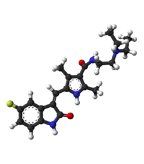Sunitinib Does Not Accelerate Tumor Growth Post-Therapy
In a new study, researchers show that sunitinib, an FDA-approved TKI for advanced renal cell carcinoma, does not result in accelerated growth of kidney tumors after discontinuing treatment.
Researchers show that sunitinib, a tyrosine kinase inhibitor approved for metastatic renal cell carcinoma (RCC) as well as progressive gastrointestinal stromal tumors (GIST), does not result in accelerated growth of kidney tumors after discontinuing treatment. The results, from Krastan B. Blagoev, PhD of the National Science Foundation, Antonio Fojo, MD, PhD of the Center for Cancer Research at the National Cancer Institute, and colleagues is published in Cell Reports. The data suggest that benefit from sunitinib is not correlated with any post-therapy biological changes that are harmful for patients.

Ball-and-stick model of sunitinib
“There is no evidence that in humans such [tumor growth] acceleration occurs with the use of sunitinib in patients with kidney cancer,” said Fojo. “We feel quite comfortable that this likely does not occur in treatment of other cancers with sunitinib,” Fojo added.
Sunitinib is an oral inhibitor of tumor angiogenesis and tumor proliferation. Its targets include the receptors of the platelet-derived growth factor as well as vascular endothelial growth factor receptors (VEGFRs), which play a role in both tumor angiogenesis and tumor cell proliferation. Several animal studies showed that anti-angiogenesis may create an environment that could accelerate metastasis, including two published in Cancer Cell in 2009 (study 1, study 2). While the animal models were breast cancer models and tested sunitinib on small early-stage tumors, in the clinic sunitinib is used for renal cell cancers in advanced stages.
For the current study, the researchers analyzed the data from the large-scale phase III clinical trial in metastatic renal cell carcinoma that led to the approval of the drug by the US Food and Drug Administration (FDA) in the United States and by the European Medicines Agency in Europe. The researchers used more than 18,000 tumor measurements in 750 patients who participated in the phase III sunitinib RCC trial.
The phase III trial compared daily sunitinib to interferon alfa given subcutaneously in treatment-naive metastatic RCC patients. In the initial analysis, the median overall survival in the sunitinib arm was 4.6 months longer compared to the interferon alfa arm (26.4 vs 21.8 months, P = .051). After leaving the trial, however, patients who received sunitinib had a shorter survival compared with those in the interferon alfa arm (median 18.7 week survival in the sunitinib arm compared to 29.1 weeks in the interferon alfa arm, P = .006). However, the authors point out that these postprotocol survival (PPS) results most likely reflect the post-trial treatment for these patients (as patients in the interferon alfa arm of the trial began sunitinib treatment), and not an accelerated tumor growth due to sunitinib. While about 60% of patients in the interferon alfa arm went on to receive sunitinib or another VEGFR inhibitor, about 20% of those in the sunitinib arm received a cytokine therapy after coming off sunitinib. It is possible, however, that interferon alfa facilitated an immune response in some patients after treatment. “The important point is that these confounding variables and not discontinuation of sunitinib could explain the differences in PPS,” state the authors.
The study shows that those patients treated with sunitinib for a longer time period did not decrease a patient’s survival after the trial. The time a patient spent on treatment had a positive impact on overall survival-patients who took sunitinib for longer periods of time survived longer. Researchers also found no correlation between tumor shrinkage while on treatment and any post-treatment survival or time on treatment that would suggest greater harm for those patients whose tumors may have responded the most while they were taking sunitinib.
While the results cannot be extrapolated to other targeted therapies, similar analyses for other phase III trials are possible, said Fojo. “We would very much like to be able to extend these observation with other drugs in other cancers.”
While an enormous amount of data is gathered during large, registration trials, its analysis is often limited to more conventional parameters, according to the researchers. We need to go beyond this, to benefit more cancer patients, said Fojo. The researchers used novel methodologies to analyze the clinical trial data.
The study was a collaboration between oncologists, biologists, and a physicist “probing existing data so as to answer questions and learn information that we hope will be valuable to cancer patients and the oncologists who treat them,” said Fojo.